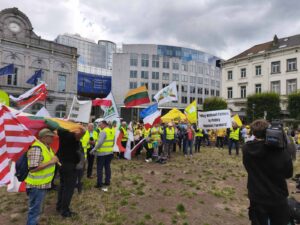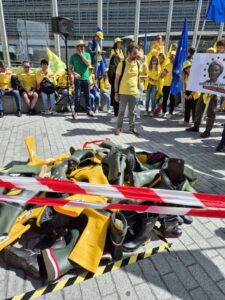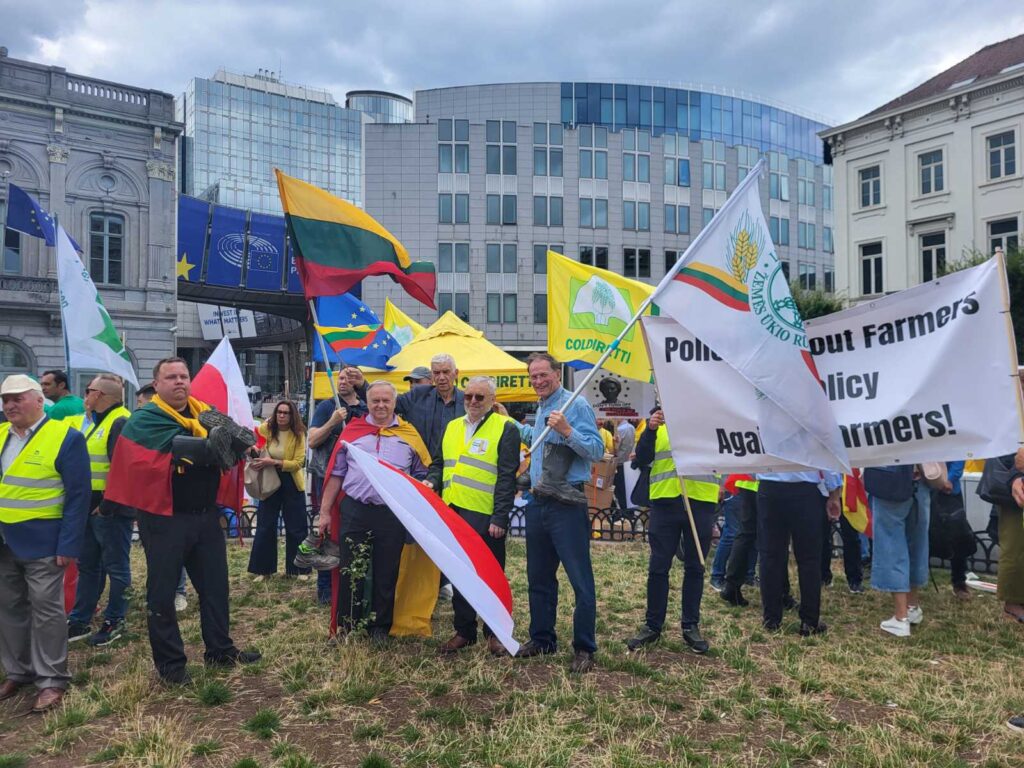On July 16, a peaceful protest took place in Brussels, the capital of Belgium, bringing together various organizations representing farmers’ interests from across the European Union (EU), including their leaders, delegates, and individual farmers. The shared goal: to express disapproval of the proposed EU budget set to take effect in early 2028.
The protest united around a thousand individuals connected to agriculture. Among them were representatives from the Lithuanian Chamber of Agriculture (LCA): President Dr. Arūnas Svitojus, Vice Presidents Algis Baravykas and Vytautas Buivydas, Jonas Kuzminskas, head of the Lithuanian Agricultural Cooperatives Association “Kooperacijos kelias,” Genrik Kolendo from the Šalčininkai District Farmers’ Association, and Darius Viliušis, board member of the Lithuanian Young Farmers and Youth Union.
The symbolic protest began in front of the European Parliament (EP), from where concerned farmers marched toward the European Commission (EC) headquarters. There, they carried out a symbolic act—piling up rubber agricultural boots.
Part of the protest remained silent, while in another part, various organization leaders voiced their concerns. Among the speakers were Massimiliano Giansanti and Lennart Nilsson, leaders of Copa and Cogeca, the main EU farmer and agricultural cooperative organizations, as well as LCA President Dr. Arūnas Svitojus. In his speech, he emphasized the importance of farmers to the future of Europe.

“Sometimes it seems like people think that without farmers, there would be no problems. But without them, who would feed others? Job creation would decline, and traditions would disappear. These things are essential if we want Europe’s rural areas to remain vibrant—if we want young people to work the land, continue what their parents started, ensure generational renewal, and build young families. They are our future,” Dr. Svitojus stressed.
He explained that the protest was sparked by the fact that, before presenting the new EU budget framework, the EC had neither consulted nor discussed with farmers, instead making some decisions unilaterally.
“We are concerned about the future of agriculture. The budget guidelines presented are unsatisfactory, so we wanted to show that we are motivated, united, and ready to fight for our rights. The protest was largely attended by Italians, Poles, Spaniards, and also Germans, Czechs, Hungarians, Croatians, and others. We all stood together with our national and organizational flags and symbols. Farmers across the EU face similar problems, and we wanted to demonstrate that we care about what lies ahead. If we don’t fight for ourselves, no one else will,” Dr. Svitojus emphasized.
Vice President V. Buivydas echoed similar sentiments, calling the protest “a day of farmer unity.” What impressed him most was that, this time, various farming organizations from EU countries—regardless of their size, interests, or other differences—united to oppose the planned budget and the proposed cuts to agriculture funding.
“We understand that funding will be reduced for many sectors in the new budget period, including agriculture. We also know that the EU will have to start repaying the loans taken during the pandemic, and considerable funds will need to be allocated for strengthening defense. It’s crucial that the remaining funds be distributed fairly and in a balanced way. Efficiency must be considered. Perhaps we should also think about reducing bureaucracy? Sometimes we fail to achieve the desired efficiency precisely because we face excessive bureaucracy. We see this even in Lithuania. For example, while the number of farmers is decreasing, the staff sizes of the Ministry of Agriculture or Ministry of Environment are not,” Buivydas noted.
According to him, saving resources requires a comprehensive and responsible approach. He believes that the EU should establish clear limits at the Union level on who should or should not be eligible for support.
“We believe that those who control more than 500 hectares of land should not receive any subsidies or support. This would be a great way to save resources. Some countries already do this. For example, our neighbors in Poland reportedly support only family farms up to 200 hectares. And everything works fine. But we, Lithuanians, by supporting even those who own tens of thousands of hectares, distort both our national and European agricultural systems. We hinder healthy competition. Just imagine: how can a young farmer compete when his neighbor owns 30,000 hectares?” Buivydas asked rhetorically.

Following the peaceful protest in Brussels, some of the farmers’ concerns were validated when the EC presented the draft budget. While certain support measures such as environmental schemes and direct payments are expected to remain untouched, funding for the overall Common Agricultural Policy is likely to be merged with other general funds, such as those for cohesion, defense, and other areas.
Interviewees did not rule out the possibility that if the EC continues to avoid dialogue with agricultural representatives and ignores their concerns, thousands of tractors from all over Europe may soon descend on Brussels in a massive protest.
“These are challenging times for all of Europe. We fully understand the need to redistribute EU funds. We know where the money is needed most, so we don’t expect miracles. But we want logical and reasonable decisions. It’s too early to draw conclusions, but we certainly won’t sit idly by. We will react—and we will fight—for a better future for agriculture,” Buivydas promised.

